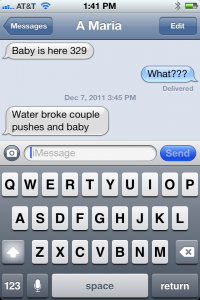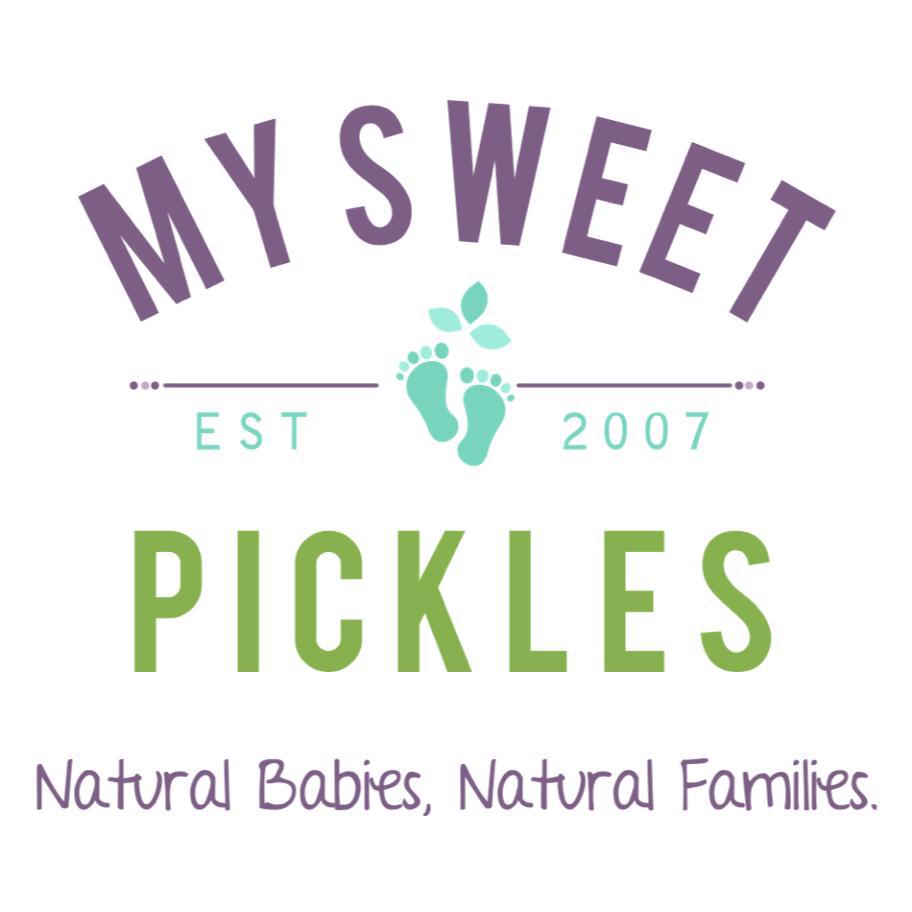I felt like a caged animal, pacing back and forth with no where to go. Greg had taken our daughter to her Grandparents’ about an hour before and we were watching TV, trying to wait until the last possible minute to go to the hospital.
Translation: DH=dear husband, DD=dear daughter, DS=dear son
My “due date” was anywhere from 12/4/11-12/6/11 depending on what date you use. The first “due date” I got using the suspected ovulation date & an online calculator was 12/7/11.
Around 1 A.M. on 12/7 I woke up with cramps & back pain. I’d been having Braxton Hicks Contractions for weeks upon weeks, and they had gone from annoying, to uncomfortable, to painful, and I’d had a few with some cramping. I thought to myself that I might want to tell DH to stay close to a phone that day in case this was “it.” After I was awoken by “cramps” and back pain every few minutes, I realized that this was, in fact, “it.”
😀
But I know someone who was!!
Hopefully I will have time to write the birth story soon. (Birth story here!) It was amazing and I feel fantastic. I still haven’t shared my other birth stories.
Yay! Mailbox Mondays! If you need cloth diaper advice, or have another question for me, please ask. Every Monday, I will answer a reader submitted question, and ask my readers to help too!
Questions don’t have to be cloth diaper related, just email maria at change-diapers.com with “Mailbox Mondays” in the subject, or fill out my contact form for readers, which you will always be able to find on my Contact Page.
Stephanie says:
I know this time around you are planning a home birth. The idea intrigues me, but scares me at the same time. If my husband and I decide to have another little one (our newest just turned 5 months old), what would you say to convince my husband and I it is a good idea? Well, more so my husband than me. 🙂 What type of preparations do you need to do at home to get ready for this? Do you need anything special?
Hi Stephanie! I’m excited that you’re considering home birth!
Before I answer you, I have to say that while I’m sharing this information, I absolutely do not judge anyone who births in the hospital, no matter why they choose it.
If you missed my post about my journey to homebirth, please do read it. My path to home birth was a long one, and it really wasn’t a single thing that pushed me to it. I spent literally years reading and researching. I read books, medical studies, you name it. This may sound corny, but no one can really convince you. It’s hard to explain but as your views on birth change, it changes you. It’s really a process. Or, it was for me anyway. So, you have to take that journey for yourself!!
Luckily, you have plenty of time, and I suggest you begin by reading about birth as a normal physiological process. I suppose I’m really not a good homebirth advocate (or advocate for anything else for that matter) because while I feel it is the right choice for me, I don’t push my views on anyone, and I tend to not mention it unless asked. While I really do feel that normal, uncomplicated childbirth doesn’t belong in the hospital, I respect the choice to have a hospital birth.
So first off, I’d suggest that you read a few books like Born in the USA: How a Broken Maternity System Must Be Fixed to Put Women and Children First, Ina May’s Guide to Childbirth
and just about any other books on my list that you can get from your local library. If you haven’t already, watch The Business of Being Born
with your husband. As you start to learn about the history of childbirth in America and how birth operates when it is unhindered, I think your mind will start to open.
I’d suggest that you and your husband both write down what intrigues you about home birth, and what scares you. If you continue to read and do research, you might find that the things that once scared you, no longer do. A lot of the things that are thrown out about why birth belongs in a hospital really aren’t true when you read the (scientific/unbiased) studies. Many of the issues and complications with birth are caused by a doctor’s inability to wait for labor to progress, their desire to interfere and “fix,” and the fact that many really have no idea what a normal birth looks like. After reading several of the books I read, you may start seeing that some of the things that you think of as being childbirth dangers are in fact iatrogenic (doctor caused) and rarely present in an unhindered birth.
If possible, join a birth circle, or home birth group. Read home birth stories and watch as many home birth videos as you can find.
Find out what the laws are in your state, what your insurance will cover, and start interviewing midwives. Some states license only Certified Nurse Midwives, some have “rules” on when they are no longer allowed to attend a home birth (after 41 weeks etc.) Educate yourself on possible complications, and the steps to take in each situation. Take charge of your body and your birth. Figure out how far you are from the hospital, and how long it would take you to get into an operating room. (I’m talking in case of a true emergency such as cord prolapse when birth is not imminent, which is actually quite rare when membranes are not artificially ruptured.) Often times, you would be able to get to the hospital with an OR waiting for you, in the same amount of time it would take to have one ready if you were already there. Find out where your nearest responding EMS is, and how long it would take them to get to you.
I don’t feel that replacing an OB with a CNM and a hospital with a bedroom is necessarily any different or better, unless your only goal is to give birth at home. Ask the midwife how long she’s been practicing, how she was trained, if she is licensed, how many births she has attended, what complications she’s encountered and how she’s handled them. How often does she do cervical checks, break water, what is her transfer rate (and the reasons for transfer.) How does she feel about breech births and how does she handle them, what steps does she take for postpartum hemorrhage (and what does she consider a hemorrhage), what steps does she take for shoulder dystocia, does she test for group b strep (and how does she treat it), does she place a time limit on placenta delivery (if so, what steps does she take?) and so on. Also important is how many clients she will take on in the same time period, if she has assistants and/or partners etc. Also ask around and find out what the midwife you’re considering is actually like, how interventive she is, how happy prior clients were with their births etc. The old “bait and switch” can happen with any medical provider!
As far as what supplies and things you need, that’s intertwined with your midwife interrogation interview. Is she certified in neonatal resusciation? Does she carry oxygen, vitamin K and pitocin with her? Does she carry any herbs with her? Typically, a midwife will give you a “birth kit” to order and hang on to (chux pads, umbilical cord clamp, sterile gloves etc.) along with a short list of other items, like an extra set of sheets, a clean towel, a large trash bag, a bowl for the placenta and such.
While I definitely recommend looking for a midwife that you are in line with and wholly trust, I also recommend taking full responsibility for your own care and researching everything for yourself. When you’ve fully educated yourself, you may find hospital birth to be a little scary.
I hope that this has helped you a little bit, and even if you do all the research and decide to go with hospital birth, you will be fully informed! 🙂
If you have had a home birth, what resources would you suggest to someone considering it?
My journey to home birth has really been a long one. I wasn’t quite sure where to start, so I’ll start at the beginning. (Cue Sound of Music soundtrack.)
At some point, I will tell the birth stories for my the two children already in my arms, but for the sake of keeping this post short enough to be readable, I’ll tell abbreviated versions.
When I became pregnant with my daughter in 2004, I wanted a natural birth. I envisioned giving birth in a birth center with a midwife. I was not incredibly “mainstream” but compared to where I am today, I really was. I had been brainwashed like many, and never would have considered home birth. Scary! Dangerous! OMG! Even though I was low risk, and the perfect candidate for home birth, I do not think I would have been successful. I just wasn’t there yet.
Anyhoo, I found an OB practice that I’d heard good things about, and who had many midwives on their roster. I called and was told that “midwives do not deliver babies in Maryland.” I took that as fact, and let that idea go. In fact, Certified Nurse Midwives (CNMs) who are licensed and backed by an OB can deliver babies in Maryland. This particular practice just chooses not to take on that liability/malpractice premium.
Around that time, an acquaintance (I “met” her because she worked with my Mom actually) gave birth at home, with an unlicensed Certified Professional Midwife (CPM). I later learned that Maryland simply doesn’t license CPMs or Direct Entry Midwives (DEMs) but at the time “unlicensed” in my mind=untrained and unqualified. I was so, so terribly wrong and I feel stupid for ever thinking this way, but it sure seemed dangerous and foolish to ignorant little me.
Long story short, I bought the hospital ticket and I sure did get the hospital ride. Though I emerged with few physical injuries, the emotional scars from my prenatal and birth “care” are with me almost 7 years later. I was bullied, belittled, intimidated, invalidated and treated like a number, a slab of meat, a “patient…” something (not someone) that didn’t matter at every turn. There were precious few moments from start to finish that I felt like I mattered in any way.
For a long time I felt like a failure, and I was grateful for the doctor, and for being in the hospital. It took years for me to realize that my biggest mistake was to go the the hospital in the first place. I didn’t fail myself or my daughter rather, I was failed by the system. I was in no position to stand up for myself. Even the strongest woman will have difficulty fighting “hospital policy” when she’s in labor. I still feel ill when I think about the ways in which I was held down and violated while I screamed (while being told to stop, be still, do what the doctor says, basically be a good girl) with my husband right there, unable to protect me (or even know that he should.) To many, my experience just doesn’t matter. My daughter was healthy, and what happened to me happens to women every day anyway.
I learned a lot between my daughter’s birth and my son’s birth, and by the time I was pregnant with him, I really wanted a home birth. I still wasn’t ready though. While home birth isn’t illegal, it would be illegal for the midwife attending me. I am a rule follower, and that really scared me. I saw the same OB throughout my pregnancy, visiting with others just once (so I would have met everyone prior to D-Day) and I really loved her. Still do. If she attended home births, I would gladly welcome her. She is just great and I really lucked out that she was on call when I went into labor.
I went into this birth very pessimistic, and afraid of feeling like a failure again, so I had very few expectations. I stayed home as long as possible, and ended up giving birth within about 3 or 3 1/2 hours of arriving at the hospital. I had 3 cervical checks that I didn’t want, intermittent monitoring that I didn’t want, and an IV, all according to “hospital policy.” While I realize that you can legally refuse these things, that’s really easier said than done. I did manage to give birth sans medication aside from GBS antibiotics (which I could write a whole post on!) and pitocin after birth (which I didn’t consent to and didn’t know I had until I requested my records this year).
All in all, I was pretty happy with the birth, and I did feel it was a somewhat healing birth. I even had an easier time bonding with my son. Even so, there were so many things that bothered me about the birth. Rather than listing those things, I’ll list the things I’m looking forward to about home birth (this may get long):
- No unnecessary interventions, and no need to fight against them. No trying desperately to stay still during a contraction so the monitors wouldn’t move, losing the HB, making it look like there was trouble & leading to more monitoring. No hands or objects shoved in me. No being forced on my back to do it, which was the most painful position for me. No being told this is what we’re doing (if they even did that much). What happened to informed consent?
- No being grilled with incessant questions while trying to cope with contractions.
- No transition to the hospital (longest.car.ride.ever.) or back to the “real world” with life with a new baby for that matter.
- No feeling inhibited by strangers’ presence, no half dozen people filtering in the room while I’m pushing, unaware that they are there.
- Ability to eat and drink what I want and use the bathroom when I want.
- Move/walk/go wherever I want.
- No artificial time constraints on any stage of labor.
- Make whatever sounds I want without inhibition.
- Push in whatever position I want to without any argument or battles.
- Finally, I won’t be the 3rd+ person to touch my baby and the absolute last person in the room to know the baby’s gender.
- Ability to bond with the baby however I want (touching, talking etc.) without feeling funny/inhibited by what I say/how I say it in front of strangers.
- No baring my body in front of strangers to nurse, be “checked” or attempting to use the bathroom on command after delivery.
- Baby won’t be taken away from me. Supposedly you have the “right” for that not to happen, but it’s easier said than done for hearing checks etc.
- No fear of procedures or treatments (or bottles or pacis) being given without my permission.
- No being bullied into giving formula.
- No being woken as soon as I fall asleep for BP, temp etc. That’s when the baby and I both aren’t being woken to check baby!
- Sleep in my own bed. Nuff said.
- Shower in my own shower with decent water pressure and a towel bigger than a washcloth. (WTF are they thinking giving postpartum women such tiny azz towels??)
- Wear whatever clothing I want, whenever I want.
- No issues with cloth diapering from birth.
- Complete access to my own house. My own food, my own couch, my own stuff, my own comfort zone.
- I control the lights and thermostat!
- No waiting for “visiting hours” for my children to meet the baby.
- No unfamiliar/possibly resistant bacteria exposure.
- Many, many more things that are slipping my mind at the moment!
I think that hospitals do have a place in some births, and I am incredibly grateful for medical intervention when necessary. In fact, I think not being comfortable with home birth, or not being “there yet” are valid reasons to have a hospital birth. I truly, truly believe in the fear/pain/tension cycle and I think that if you fear home birth, it’s not for you. (Though I am the perfect example of doing a 180 after educating myself.)
I wanted to share a few of the books I read on my way to where I am today (which is pretty “far out there” as far as birth hippies go, LOL!) They are Amazon affiliate links when available, so I would receive a small commission if you clicked through and bought. I was able to find most at my local library, or through inter-library loan.
Pushed: The Painful Truth About Childbirth and Modern Maternity Care
Immaculate Deception II: Myth, Magic and Birth
Natural Childbirth the Bradley Way: Revised Edition
Birthing from Within: An Extra-Ordinary Guide to Childbirth Preparation
Childbirth without Fear: The Principles and Practice of Natural Childbirth (Import)
Expecting Trouble: What Expectant Parents Should Know About Prenatal Care in America
Born in the USA: How a Broken Maternity System Must Be Fixed to Put Women and Children First
(if I had to choose just ONE book as a favorite, must read, this would be it.)
The Thinking Woman’s Guide to a Better Birth
Natural Birth: A Holistic Guide to Pregnancy, Childbirth, and Breastfeeding
Heart and Hands: A Midwife’s Guide to Pregnancy and Birth
Get Me Out: A History of Childbirth from the Garden of Eden to the Sperm Bank
Lying-In: A History of Childbirth in America, Expanded Edition
Emergency Childbirth: A Manual
Birth Emergency Skills Training: Manual for Out -of- Hospital Midwives
Deliver Me from Pain: Anesthesia and Birth in America
Birth as an American Rite of Passage
I know this isn’t all of them, I just can’t remember them all!
There are a few other books on my list that I haven’t been able to find at the library, so I am considering buying the e-book versions:
Obstetric Myths Versus Research Realities: A Guide to the Medical Literature
Orgasmic Birth: Your Guide to a Safe, Satisfying, and Pleasurable Birth Experience
Birthing the Easy Way By Someone Who Learned the Hard Way
Unassisted Homebirth: An Act of Love
I have also been active in natural childbirth groups, and have read countless birth stories. Good and bad, blissful and catastrophic. Watched countless birth videos and read every medical study I could get my hands on. I’ve familiarized myself with complications possible during every stage, and have taken full responsibility for my care.
Naturally, we watched the requisite The Business of Being Born and Pregnant in America
also!
Needless to say, I didn’t make this decision on a whim, and I am very grateful to have an intelligent husband, who can listen to and understand the facts, and who supports me fully. He was a little bit slower to move over to the home birth side, but he was able to have reasonable conversations with me, express his concerns, and allow me to do additional research for him to allay his fears.
I do hope to share my birth stories at some point. However, it wasn’t a bad hospital birth that “drove me to home birth.” I truly, completely believe that home birth is the safest, best choice for me and my family. My previous births definitely did play a role in my trip to where I am now. Would I go back and have a home birth with my first child? I don’t know. Maybe if I knew then, all that I know now. Otherwise, no. I don’t think I would have succeeded because I wasn’t ready.
Read my home birth story.














































 Maria wants to live in a world where cloth diapers are the norm and moms can make parenting choices without judgement. When she’s not chasing her 18, 14 and 11-year old kids around, you might find her checking out the latest gadgets, organizing something (again) or exercising in the fresh air.
Maria wants to live in a world where cloth diapers are the norm and moms can make parenting choices without judgement. When she’s not chasing her 18, 14 and 11-year old kids around, you might find her checking out the latest gadgets, organizing something (again) or exercising in the fresh air. 






